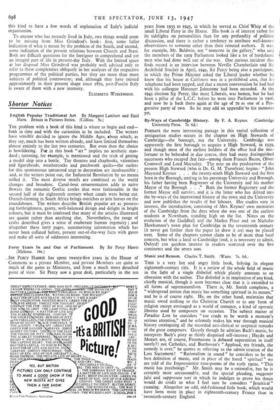By-Ways of Cambridge History. By F. A. Keynes. (Cambridge
University Press. - 7s:6d.)
PERHAPS the most interesting passage in this varied collection of antiquarian studies occurs in the chapter on. High Stewards of Cambridge—the borough, not the University. Cambridge was apparently the first borough to acquire a High Steward, in 1529, and though most of the earliest holders of the office had the mis- fortune to be beheaded in. due course, they had many distinguished successors who escaped that fate—among them Francis Bacon, Oliver Cromwell and Lord Macaulay. The note on the predecessor of the present High Steward (who is Dr. G. M. Trevelyan) begins: " John Maynard Keynes . . . the twenty-ninth High Steward and the first born in the Borough, uniting in his parentage University and Borough, his father having been Registrary of the University and his mother Mayor of the Borough . . ." Both the former Registrary and the former Mayor still survive, and it is the latter who has delved into the by-ways of the intertwined history of the town and the University and now publishes the results of her labours. Her studies vary in interest, the introduction, consisting of Mrs. Keynes' own memories of the Cambridge from the days when she was one of the earliest students at Newnham, standing high on the list. - Notes on the evolution of the Guildhall and the Market- Place and on Nicholas Hawksmoor's town plan for Cambridge in the seventeenth century (it never got farther than the paper he drew it on) may be placed next. Some of the chapters cannot claim to be of more than local concern, but what is local to Cambridge (and, it is necessary to admit, Oxford) can quicken interest in readers scattered over the five continents and the • seven seas.


































 Previous page
Previous page